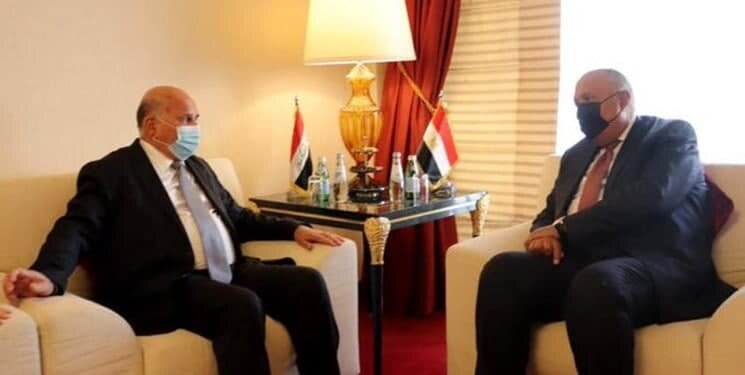Iraqi FM calls on neighboring countries to hold dialogue in Baghdad

TEHRAN – Iraqi Foreign Minister Fuad Hussein has called on his country’s neighbors to hold dialogue in Baghdad to solve disputes and bring closer the views of the stakeholders.
Hussein made the remarks during a meeting with his Egyptian counterpart Sameh Shoukry.
The Iraqi foreign minister, who is in Doha to attend a meeting of Arab foreign ministers, met with Shoukry at the sidelines of the ministerial meeting.
During the meeting, the two sides discussed ways to improve the level of bilateral relations and interest in developing relations in all fields.
The Iraqi Foreign Ministry said in a statement that the two sides also discussed the latest developments in the region and the need to maintain security and stability in the region and try to resolve problems and crises through dialogue and de-escalation, and stressed the importance of increasing consultation and exchange of views on regional issues of mutual interest, according to Fars News.
During the meeting, the Iraqi foreign minister stressed the importance of holding a tripartite meeting between Iraq, Egypt and Jordan, and called for a dialogue between Iraq's neighbors in Baghdad in order to bring them closer, strengthen the dialogue mechanism and negotiate a solution to all regional issues.
Hussein arrived in Doha on Monday to attend extraordinary and consultative meetings of Arab foreign ministers to discuss Arab issues, including the issue of Palestine and an Ethiopian dam on the Nile River.
Earlier, Iraqi President Barham Saleh said that Baghdad had repeatedly hosted a dialogue between Saudi Arabia and Iran.
Hussein did not specify the neighbors that can hold dialogue in Iraq, but Baghdad has played host to several rounds of behind-the-scene talks between Iran and Saudi Arabia. Earlier in May, an official at the Saudi Ministry of Foreign Affairs had confirmed that the Riyadh-Tehran dialogue has taken place.
Ambassador Rayed Krimly, head of the policy planning at the ministry, told Reuters that the talks are to “reduce tensions in the region.”
The official expressed hope that the talks would conclude positively, “but it’s too early, and premature, reach any definitive conclusions.”
A day after, Iranian ambassador to Iraq Iraj Masjedi welcomed de-escalation in the region. He said a new approach has been taken in the countries of the region to resolve differences and tensions, and Iran welcomes that.
“The Islamic Republic has always been a promoter and supporter of peace and friendship, so we welcome the resolution of any differences, especially with Muslim and neighboring countries in the region,” the ambassador said.
He added, “The Islamic Republic is interested in developing its relations with Islamic countries and the region so that there will be no differences and tensions in the region.”
The diplomat stated that a new atmosphere has been created in neighboring countries and the region to resolve tensions with Iran, “which we welcome and hopefully will achieve results.”
“We welcome and encourage Iraq to be able to play a constructive and positive role in this regard,” Masjedi said.
On Tuesday, the London-based Al Arab, a newspaper believed to be owned by the United Arab Emirates, reported that the venue for the Saudi-Iranian dialogue has been moved from Baghdad to Muscat.
Citing Omani political sources, the newspaper said that Muscat will host the second phase of the dialogue between the two countries after Iraq hosted the first phase, which consisted of introductory sessions in which each side presented its demands and also exchanged words of courtesy while working at building mutual trust.
The news of transferring the place of dialogue came after Saudi Foreign Minister Prince Faisal bin Farhan paid a short visit on Monday to Oman.
Oman’s state news reported that the Saudi minister “carried a verbal message from Saudi King Salman bin Abdulaziz to Sultan Haitham bin Tariq, related to relations between the two countries and prospects for strengthening them.”
Oman is known for its role in facilitating the nuclear talks between Iran and the U.S., which led to the signing of the 2015 nuclear deal, formally called the Joint Comprehensive Plan of Action (JCPOA). Oman is also playing a role in brokering a de-escalation between the Sanaa-based government of Yemen and Saudi Arabia.
SM/PA
Leave a Comment